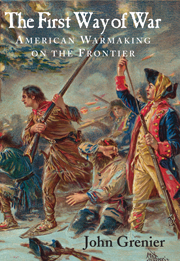Book contents
- Frontmatter
- Contents
- List of Figures and Maps
- Preface
- Acknowledgments
- List of Abbreviations
- Introduction
- 1 The First Way of War's Origins in Colonial America
- 2 The First Way of War in the North American Wars of King George II, 1739–1755
- 3 Continental and British Petite Guerre, circa 1750
- 4 The First Way of War in the Seven Years' War, 1754–1763
- 5 The First Way of War in the Era of the American Revolution
- 6 The First Way of War in the 1790s
- 7 The First Way of War and the Final Conquest of the Transappalachian West
- Epilogue
- Index
2 - The First Way of War in the North American Wars of King George II, 1739–1755
Published online by Cambridge University Press: 05 June 2012
- Frontmatter
- Contents
- List of Figures and Maps
- Preface
- Acknowledgments
- List of Abbreviations
- Introduction
- 1 The First Way of War's Origins in Colonial America
- 2 The First Way of War in the North American Wars of King George II, 1739–1755
- 3 Continental and British Petite Guerre, circa 1750
- 4 The First Way of War in the Seven Years' War, 1754–1763
- 5 The First Way of War in the Era of the American Revolution
- 6 The First Way of War in the 1790s
- 7 The First Way of War and the Final Conquest of the Transappalachian West
- Epilogue
- Index
Summary
In late 1752, Governor Peregrine Thomas Hopson dispatched to the Board of Trade a report in which he assessed the contributions that American rangers had made to Nova Scotia's defense. The Board wanted Hopson's opinion on the necessity and feasibility of keeping a company of rangers in that colony's defensive establishment. While Hopson failed to offer a precise recommendation on the exact number of them needed in Nova Scotia, he nonetheless provided a justification for keeping at least a minimal force of rangers on the colony's rolls. “I am not able to inform your Lordships that I have heard of any particular exploit worth remarking being done by the Rangers,” Hopson wrote, “the nature of their service, being irregular, scarcely admits of it, but they have most assuredly been of great utility, such as protecting the out settlers, ranging the Country, and marching upon services the regulars would not be spared for.”
Hopson's assessment of the rangers' “great utility” points to the central and ubiquitous role that they played not only in Nova Scotia, but in each of the first three Wars of King George II – the War of Jenkins' Ear, King George's War, and Father Le Loutre's War. British officials and commanders in those conflicts, first out of military necessity and then out of preference, turned to American rangers.
- Type
- Chapter
- Information
- The First Way of WarAmerican War Making on the Frontier, 1607–1814, pp. 53 - 86Publisher: Cambridge University PressPrint publication year: 2005



